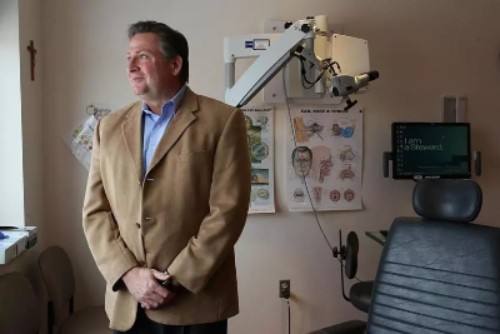Blog
-

It’s hard to make a chicken deaf…
 29 Jan , 2018
29 Jan , 2018
It’s hard to make a chicken deaf…
It sounds like a joke, but by sound-blasting chickens, and looking at their inner ears, researchers found that chickens can regrow hair cells crucial for hearing. If this same cell regeneration could be replicated in humans, it could lead to a cure for deafness.
It was this finding, more than two decades ago, that launched audiologist and researcher Mark Parker on a similar quest to study stem cell and gene therapy, to battle hearing loss. He was an audiology student at the time, and was so intrigued by the chicken project that it became the impetus for him to become a neuroscientist after he finished his audiology degree.
“I also wanted a challenge, and I honestly thought that becoming a neuroscientist was the hardest thing I could do at the time,” Parker laughs. “It was that, or rocket science.” Now he is director of audiology at St. Elizabeth’s Medical Center in Boston, where he leads a team of clinicians who diagnose and treat hearing and balance disorders — and he continues to study stem cell and gene therapy to search for a biological remedy for hearing loss.
Chickens aside, perhaps it was almost inevitable that Parker became an audiologist; his paternal grandparents were deaf, his maternal grandmother was a hearing instrument specialist, and his father and sister are audiologists on the West Coast.
“My father said he went into audiology because he wanted to save deaf kids,” he says. “I knew my grandpa was proud of being deaf and didn’t need ‘saving,’ but I was attracted by the science aspect.”
Parker’s clinic includes a hearing aid center, featuring conventional and implantable hearing aids. “My goal is to maximize a person’s residual hearing as much as possible, whether it’s an infant or an elderly adult,” he says.
He also serves as the director of the Newborn Hearing Screening program for Steward Health Care System — which owns St Elizabeth’s — helping to screen babies for hearing loss before they leave the hospital, part of a state mandate. The Globe spoke with Parker about his life and work.
“The auditory system is fascinating to me because of its intricacy. It’s a highly structured system, and if any part becomes dysfunctional, hearing impairment will likely occur. Since I’m at a Boston teaching hospital, we see a wide variety of hearing disorders, the most common being age-related hearing loss. Everyone loses hearing sensitivity as they age. In fact, it’s rather abnormal for older folks to have normal hearing. Luckily, it’s easily treated with hearing aids if caught early.
The latest models digitally sample the environment and change the way they perform based on the setting you’re in. They have adaptive directional microphones, advanced noise reduction algorithms, and seamlessly integrate with cellphones and other Bluetooth devices. Even with all these advances, however, the skill of the professional who fits the hearing aid is most important for a successful outcome.
“Recently, the FDA has approved the over-the-counter sale of hearing aids. Consumers will be able to buy them at drug stores like CVS in the near future. I have mixed feelings about this — I don’t think a big-box approach is the best way to address individuals. At our clinic, we see patients with tinnitus (ringing in the ears), dizziness, and balance problems. [We] conduct specialized auditory testing, and much more.
“I’ve seen my share of odd incidents here — jelly bean stuck in the ear canal, a pencil that punctured an ear drum. I once even saw a green army man toy stuck in someone’s ear. I was like, ‘Wow, look at that.’
“Have I had my own hearing tested? Yes, many times. It’s rather ironic, but my wife keeps saying I need a hearing aid. I’m on the cusp; my hearing is in the low range of normal. I have only myself to blame – when I was younger, I assaulted my auditory system with rock music. This is especially incongruous because my dad repeatedly warned me about ear protection. I remember one AC/DC concert in particular, and the song “Hell’s Bells” The cannon noise — part of the percussion — blasted through the stadium. I knew I was in trouble when I turned to my friends afterward and saw their lips moving but only heard ringing in my ears. Oh, the show was so awesome. But today I’m paying for it.”
Source: The Boston Globe
Image credit: Suzanne Kreitter/ Globe Staff
(Mark Parker in an examination room at St. Elizabeth’s Medical Center in Brighton, where he leads a team of clinicians).





























































































































































































































































































































































































































































































































































































